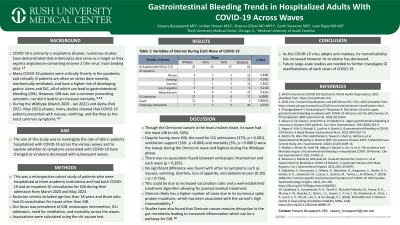Tuesday Poster Session
Category: GI Bleeding
P4164 - Gastrointestinal Bleeding Trends in Hospitalized Adults With COVID-19 Across Waves
Tuesday, October 29, 2024
10:30 AM - 4:00 PM ET
Location: Exhibit Hall E

Has Audio

Kesany Boupapanh, MD
Rush University Medical Center
Chicago, IL
Presenting Author(s)
Kesany Boupapanh, MD1, Jordan Houser, BS1, Sheena Gilliani, MD1, Garth Swanson, MD2, Juan Rojas, MD1
1Rush University Medical Center, Chicago, IL; 2Medical University of South Carolina, Chicago, SC
Introduction: Over 772 million cases and 7 million deaths have resulted from the COVID-19 pandemic. While primarily a respiratory disease, studies have shown that enterocytes are also targeted by the virus. During the Wildtype (March 2020 - Jan 2021) and Alpha (Feb 2021 - May 2021) phases, patients often experienced nausea, vomiting, diarrhea, and rare gastrointestinal bleeding (GIB). However, the prevalence and outcomes of GIB during the Delta (June 2021 - Nov 2021) and Omicron (Dec 2021 - Current) phases have not been extensively studied. This study aims to investigate the rate of GIB in hospitalized COVID-19 patients across various waves and explore changes in GI symptoms as the virus's virulence decreased.
Methods: This retrospective cohort study included patients hospitalized at three academic institutions with COVID-19 and an inpatient GI consultation for GIB from March 2020 to May 2023. Exclusion criteria were age under 18 and GI consultations for issues other than GIB. The study focused on GIB prevalence, endoscopic intervention, ICU admission, ventilation need, and mortality across waves. Associations were calculated using the chi-square test.
Results: Among 338 cases, 117 patients had GIB. The Omicron wave had the most GIB cases (n=64, 54%), followed by the Wildtype (n=25, 21%), Delta (n=14, 12%), and Alpha (n=14, 12%) waves. Despite more GIB cases during Omicron, ICU admissions (27%, p < 0.001), ventilation support (16%, p = 0.004), and mortality (3%, p < 0.0001) were lowest during this wave and highest during the Wildtype phase. No association was found between endoscopic intervention and each wave (p = 0.305). There were no significant differences in other GI symptoms like nausea, vomiting, diarrhea, loss of appetite, and abdominal pain (0.105 < p < 0.756).
Discussion: The Omicron wave saw more GIB cases, but significantly fewer ICU admissions, ventilation needs, and lower mortality, likely due to increased vaccination rates and established treatment protocols. Omicron's numerous spike protein mutations increase its transmissibility, and it disrupts gut microbiota, leading to inflammation and GIB. Further research is needed to understand how COVID-19's GI manifestations evolve with its mutations.
Note: The table for this abstract can be viewed in the ePoster Gallery section of the ACG 2024 ePoster Site or in The American Journal of Gastroenterology's abstract supplement issue, both of which will be available starting October 27, 2024.
Disclosures:
Kesany Boupapanh, MD1, Jordan Houser, BS1, Sheena Gilliani, MD1, Garth Swanson, MD2, Juan Rojas, MD1. P4164 - Gastrointestinal Bleeding Trends in Hospitalized Adults With COVID-19 Across Waves, ACG 2024 Annual Scientific Meeting Abstracts. Philadelphia, PA: American College of Gastroenterology.
1Rush University Medical Center, Chicago, IL; 2Medical University of South Carolina, Chicago, SC
Introduction: Over 772 million cases and 7 million deaths have resulted from the COVID-19 pandemic. While primarily a respiratory disease, studies have shown that enterocytes are also targeted by the virus. During the Wildtype (March 2020 - Jan 2021) and Alpha (Feb 2021 - May 2021) phases, patients often experienced nausea, vomiting, diarrhea, and rare gastrointestinal bleeding (GIB). However, the prevalence and outcomes of GIB during the Delta (June 2021 - Nov 2021) and Omicron (Dec 2021 - Current) phases have not been extensively studied. This study aims to investigate the rate of GIB in hospitalized COVID-19 patients across various waves and explore changes in GI symptoms as the virus's virulence decreased.
Methods: This retrospective cohort study included patients hospitalized at three academic institutions with COVID-19 and an inpatient GI consultation for GIB from March 2020 to May 2023. Exclusion criteria were age under 18 and GI consultations for issues other than GIB. The study focused on GIB prevalence, endoscopic intervention, ICU admission, ventilation need, and mortality across waves. Associations were calculated using the chi-square test.
Results: Among 338 cases, 117 patients had GIB. The Omicron wave had the most GIB cases (n=64, 54%), followed by the Wildtype (n=25, 21%), Delta (n=14, 12%), and Alpha (n=14, 12%) waves. Despite more GIB cases during Omicron, ICU admissions (27%, p < 0.001), ventilation support (16%, p = 0.004), and mortality (3%, p < 0.0001) were lowest during this wave and highest during the Wildtype phase. No association was found between endoscopic intervention and each wave (p = 0.305). There were no significant differences in other GI symptoms like nausea, vomiting, diarrhea, loss of appetite, and abdominal pain (0.105 < p < 0.756).
Discussion: The Omicron wave saw more GIB cases, but significantly fewer ICU admissions, ventilation needs, and lower mortality, likely due to increased vaccination rates and established treatment protocols. Omicron's numerous spike protein mutations increase its transmissibility, and it disrupts gut microbiota, leading to inflammation and GIB. Further research is needed to understand how COVID-19's GI manifestations evolve with its mutations.
Note: The table for this abstract can be viewed in the ePoster Gallery section of the ACG 2024 ePoster Site or in The American Journal of Gastroenterology's abstract supplement issue, both of which will be available starting October 27, 2024.
Disclosures:
Kesany Boupapanh indicated no relevant financial relationships.
Jordan Houser indicated no relevant financial relationships.
Sheena Gilliani indicated no relevant financial relationships.
Garth Swanson indicated no relevant financial relationships.
Juan Rojas indicated no relevant financial relationships.
Kesany Boupapanh, MD1, Jordan Houser, BS1, Sheena Gilliani, MD1, Garth Swanson, MD2, Juan Rojas, MD1. P4164 - Gastrointestinal Bleeding Trends in Hospitalized Adults With COVID-19 Across Waves, ACG 2024 Annual Scientific Meeting Abstracts. Philadelphia, PA: American College of Gastroenterology.

